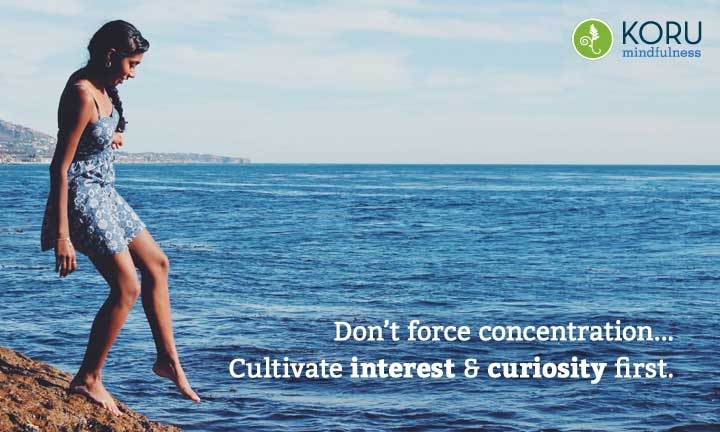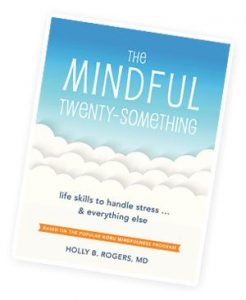
Here’s a sampling of reflections from the meditation logs my students in my Koru class submitted this week:
“Can’t focus today. Yesterday was better.”
“Mind too restless. Can’t focus.”
“Too tired to concentrate. Mind wandering all over.”
You can tell from these comments that my students feel like their wandering minds are a problem.
This of course is standard practice for all us meditators. No matter what we are told, or what we say, we really just want our minds to focus already.
What if it wasn’t a problem that your mind won’t focus?
What if having stable concentration wasn’t your expectation when you sat down to meditate? Would that make the experience somewhat easier? Would you be less prone to self-criticism and frustration?
Meditation teacher and psychiatrist Judson Brewer has a suggestion that can help with this particular challenge. He says, instead of trying to force yourself to concentrate, cultivate interest and curiosity.
Judson points out that Buddha, who as it turns out was a gifted observer of the human psyche, taught that concentration was one of the consequences of mindfulness, not a necessary cause.
Buddha outlined 7 factors of awakening or enlightenment, and explained that they happen in a particular sequence. Here they are:

- Mindfulness
- Investigation
- Energy
- Joy or rapture
- Relaxation or tranquility of both body and mind.
- Concentration
- Equanimity
Notice that the first one is mindfulness, simply paying attention to what is happening right now. Concentration doesn’t show up until almost the end, right before equanimity, that state of staying grounded and calm despite the circumstances.
You don’t need to memorize this list or get all caught up in the various definitions, but it is helpful to see that concentration doesn’t have to be strong to start working on your mindfulness.
Brewer says this about the process:
At times when concentration is not yet strong, we can incline the mind towards a curious interest in whatever is happening, thereby creating the conditions that allow joy, relaxation, and then concentration to arise.

If you begin to investigate whatever crazy thing your mind is up to, then interest will follow. Once you are interested in something—your favorite video game, for example—you can concentrate easily. You can try the same strategy with meditation. Don’t force concentration; cultivate interest first.
Like being a scientist or a sleuth, you can conduct an investigation of the moment at hand.
If you notice you are restless and your mind won’t settle, you have just made an excellent observation. That is perfect mindfulness.
Now investigate further: how can you tell you are restless? What does that feel like in your body? And where is your mind heading next?
So rather than see it as a problem that you can’t concentrate, develop some intrigue about what your mind is up to.
Understanding that the mind progresses from mindfulness to concentration is helpful to me. Knowing this, I don’t have to sit around and wait for powerful concentration to develop before I start meditating. Instead, I can just look inside and see what is happening.
Next time you sit down to meditate, and you notice your mind is all over the place, ask yourself: What is happening right now? And then just enjoy the ride.
Like this article? You might like our post: How I started meditating (and 4 steps to get you started.)
Cover photo by Christopher Sardegna on Unsplash
Get our latest articles in your inbox.

Turning this on it’s head is useful…. When my minds busy i often consider meditating as being too hard. However, this speaks to remembering that my concentration will improve through meditation
Hey Theresa, Thanks for your comment. And, yes! With practice our mind becomes more steady, and we don’t have to wait for that to happen to begin to practice. I find that reassuring!
Very simple and direct in acceptance and re-engagement of the mindful process. I appreciate the simplicity without the Buddhist jargon, even though the 7 points come directly from the Buddha!
Thanks Holly!